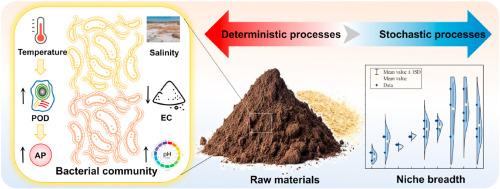高盐、高碱度堆肥条件下微生物群落演替机制及相互作用动态
IF 8.4
2区 环境科学与生态学
Q1 ENVIRONMENTAL SCIENCES
引用次数: 0
摘要
在堆肥过程中,微生物驱动有机物降解和腐殖质化。然而,盐碱胁迫下微生物群落演替及其相互作用的机制尚不清楚。在本研究中,我们研究了高盐碱地区堆肥过程中微生物群落组装过程和微生物生态位动态。微生物群落的生态位宽度从5.8扩展到15,盐碱条件的缓解促使微生物群落的聚集向随机过程转变。碱度(R = 69.08%)和有效磷(AP) (R = 45.70%)是主要的环境胁迫因子。盐度主要影响生态位宽度,而碱度主要决定微生物的组装过程。高温环境下有机物的降解促进了AP的释放,改变了微生物群落的组装过程,驱动了微生物群落的生态位分化。丰富的类群积极响应环境条件的变化,而稀有的类群则通过扩大生态位来维持群落的稳定。微生物之间的相互作用主要基于协同作用。原生微生物如Alcanivorax、棒状杆菌(Corynebacterium)和Rhodohalobacter在促进堆肥成熟中起关键作用。它们能忍受高盐度和碱性环境,也能承受高温。本研究首次揭示了盐温胁迫下微生物群落演替机制及相互作用特征,为高盐碱性有机废弃物堆肥过程中微生物接种提供理论指导。本文章由计算机程序翻译,如有差异,请以英文原文为准。

The community succession mechanisms and interactive dynamics of microorganisms under high salinity and alkalinity conditions during composting
Microorganisms drive organic matter degradation and humification during composting. However, the mechanisms underlying microbial community succession and their interactions under saline-alkali stress are poorly understood. In this study, we investigated the microbial community assembly processes and microbial niche dynamics during composting in the high-saline-alkaline region. The niche breadth of the microbial community expanded from 5.8 to 15 and salt-alkali conditions alleviation prompted a shift in microbial community assembly towards stochastic processes. Alkalinity (R = 69.08%) and available phosphorus (AP) (R = 45.70%) are identified as the primary environmental stress factors. Salinity primarily impacted the niche breadth, while alkalinity predominantly determined the assembly processes of microorganisms. The degradation of organic matter in high-temperature environments enhanced the release of AP, altering the processes of microbial community assembly and driving niche differentiation within the microbial community. The abundant taxa actively responded to the changes in the environmental conditions, while the rare taxa maintained the community stability by expanding their ecological niches. The interactions between microorganisms are mainly based on synergism. The native microorganisms, such as Alcanivorax, Corynebacterium, and Rhodohalobacter, played a key role in promoting compost maturity. They tolerated the high-salinity and alkaline environments and also withstood high temperatures. This study revealed for the first time the succession mechanisms and interaction characteristics of microbial communities under salinity and temperature stress, providing theoretical guidance for microbial inoculation during the composting of high-saline and alkaline organic waste.
求助全文
通过发布文献求助,成功后即可免费获取论文全文。
去求助
来源期刊

Journal of Environmental Management
环境科学-环境科学
CiteScore
13.70
自引率
5.70%
发文量
2477
审稿时长
84 days
期刊介绍:
The Journal of Environmental Management is a journal for the publication of peer reviewed, original research for all aspects of management and the managed use of the environment, both natural and man-made.Critical review articles are also welcome; submission of these is strongly encouraged.
 求助内容:
求助内容: 应助结果提醒方式:
应助结果提醒方式:


